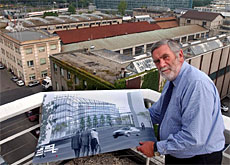
Serono concentrates minds

Swiss science has been given a shot in the arm by Serono's plan to create a major research "campus" at its headquarters in Geneva.
The decision is a welcome tonic following Novartis’s move last year to concentrate its research efforts in the US.
Serono, Europe’s leading biotechnology company and the third largest in the world, has set aside SFr500 million ($332 million) to develop the new complex.
Project “Horizon Serono” will involve all the company’s research staff – currently working at a site on the other side of Geneva – joining the administration and marketing departments at a new purpose-built facility.
“We’re concentrating what we already have in Geneva on one site. But we’re also planning for expansion over the next eight years,” says James Grozier, who is leading the project.
From research to the market
He said this major undertaking would result in a more efficient operation: “We’ll be able to optimise our activities by having everyone – research, marketing, clinical development – on one site.”
The new Serono complex, which ultimately will cover some 4.3 hectares in the Sécheron district, has been described as a campus.
Serono is confident it will provide an environment conducive to high-quality research.
By the end of the first phase, in 2006, there will be around 1,250 people working there. That figure will rise to some 2,000 between 2008 and 2010.
Expanded research, Serono believes, should lead to more products, which will hit the market quicker.
This would greatly increase the chances of it repeating the success of its Rebif multiple sclerosis drug.
Earlier this year Rebif was given the green light in the United States, and the marketing exclusivity of the rival drug, Avonex, made by Biogen, was halted ahead of schedule.
Switzerland or Boston?
Serono’s decision is being seen as a significant vote of confidence in the Swiss research sector.
Academics were dealt a blow in May when another Swiss company, the pharmaceuticals giant Novartis, announced that it would be establishing its global research hub in Boston.
Novartis said its decision was motivated by the fact that, given the proximity of major academic establishments like Harvard and MIT, it was easier to recruit the best scientists in the Boston area.
Serono, too, has a research centre in Boston, on which the Geneva development is being modelled.
The US base will be unaffected by the changes, since it concentrates on research into fertility treatments, whereas the Geneva site concerns itself more with clinical and molecular research.
Best of both worlds
Grozier says Serono wants to have the best of both worlds: being close to those top academics in Boston, while at the same time developing its business in Europe.
Novartis is maintaining its research centre in Basel, but its decision to locate its hub in Boston was nonetheless greeted with shock and dismay by the Swiss research establishment.
The message from Serono is that there are still plenty of top-notch scientists in Switzerland.
“The Lake Geneva area has become a centre for bio-research. We’re demonstrating our continuing confidence in Switzerland,” Grozier told swissinfo.
Serono, which already collaborates with the three local higher education establishments, is also benefiting from the dynamism of the Lake Geneva area, which has become a fertile ground for start-up companies and research into new technologies.
The biotech multinational has been based in Geneva for 25 years, and its decision is an important statement of intent that will have pleased the Geneva cantonal government.
Dynamic region
As well as trying to attract new hi-tech companies to the region, it has devoted enormous time and energy to convincing multinationals established on its territory that they should stay.
The move is good news for Sécheron, an industrial area lying near the city’s international zone, which will be revamped as part of the project.
Many protected buildings, which bear witness to Geneva’s industrial heritage, will be incorporated into the new site.
“Our concept is one of sustainable construction,” says Grozier, pointing out that lake water will be used for the air conditioning and heating systems.
Existing pollution will also be cleaned up. “We want to continue to be a very clean and responsible neighbour,” he adds.
Serono is also negotiating with the Swiss Federal Railways to build a special siding so that noise and inconvenience for local residents can be kept to a minimum when waste materials are being removed from the site during demolition.
The company hopes to forge stronger links with the general public, thanks to a permanent exhibition and allowing access to its cafeteria and gym.
“We want to explain what biotechnology is to the public, and to take the mystery out of what we do,” says Grozier.
swissinfo, Roy Probert in Geneva
Serono, based in Geneva since 1977, is Europe’s biggest biotechnology firm and the third largest in the world.
First phase of Horizon Serono to be completed in 2006.
By the end of the second phase, there will be 2,000 employees at the new site.

In compliance with the JTI standards
More: SWI swissinfo.ch certified by the Journalism Trust Initiative




























You can find an overview of ongoing debates with our journalists here . Please join us!
If you want to start a conversation about a topic raised in this article or want to report factual errors, email us at english@swissinfo.ch.